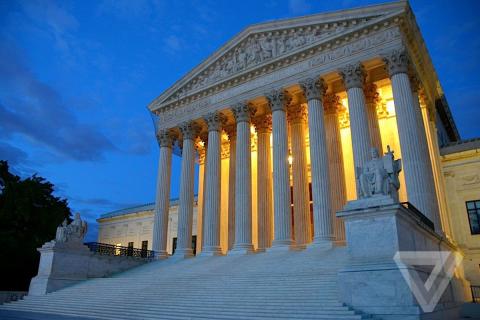<p><br>
</p>
<p>The United States Supreme Court issued two rulings today that saw conservative Justices side with the four liberal members of the Court in separate cases that defend LGBTQ+ employees from discrimination and uphold California’s “sanctuary state” laws.</p>
<p>In the first case, the Court ruled that gay, lesbian, and transgender employees are protected from workplace discrimination by Title VII of the 1964 Civil Rights Act for the same reasons that employers cannot discriminate based on sex. Chief Justice John Roberts and Justice Neil Gorsuch voted with Justices Ruth Bader Ginsburg, Elena Kagan, Sonia Sotomayor, and Stephen Breyer</p>
<p>“An employer who fires an individual for being homosexual or transgender fires that person for traits or actions it would not have questioned in members of a different sex,” Justice Neil Gorsuch wrote for the court. “Sex plays a necessary and undisguisable role in the decision, exactly what Title VII forbids.”</p>
<p>Justices Samuel Alito, Brett Kavanaugh, and Clarence Thomas dissented.</p>
<p>The case represents a big victory for the estimated 8 million LGBT employees in the US that have not been protected from workplace discrimination. Currently, only 21 states specifically protect LGBTQ workers from employment discrimination. But the case does have some limitations; it only applies to companies with 15 or more employees.</p>
<p>Justice Samuel Alito, one of the most conservative members of the Court, wrote the minority’s dissent.</p>
<p>“The Court tries to convince readers that it is merely enforcing the terms of the statute, but that is preposterous,” Justice Alito wrote. “Even as understood today, the concept of discrimination because of ‘sex’ is different from discrimination because of ‘sexual orientation’ or ‘gender identity.’”</p>
<p>Even though Justice Brett Kavanaugh also voted against the outcome of the case and wrote his won dissent message, he acknowledged that it was an “<em>important victory achieved today by gay and lesbian Americans.</em>”</p>
<p>The ruling now clarifies that employees are protected from discrimination based on race, color, religion, sex, and national origin, including sexual orientation or gender identity.</p>
<p>This was the first case involving gay rights that has come before the Court since the retirement of Justice Anthony Kennedy in 2017. Kennedy, a Republican appointed by President Reagan, was usually the swing vote on issues involving gay rights and was the author of the landmark ruling in 2015 that made same-sex marriage legal throughout the United States. Kennedy was replaced on the bench by President Trump with Brett Kavanaugh who is more conservative and, as expected, voted against this case.</p>
<p>Justice Gorsuch was President Trump’s first appointment to the Court after Republicans in the Senate stalled President Obama’s nomination of Merrick Garland in 2016. Republicans and conservative judiciary advocates lobbied Trump to appoint Gorsuch who is known to hold conservative views, but his vote in this case signaled his independence and fidelity to interpreting laws based mainly on their plain text reading, referred to as strict construction.</p>
<p>In the second case, the Court let stand an appeals court decision that upheld California’s law that restricts local police from helping federal authorities arrest and deport undocumented immigrants.</p>
<p>The law restricts local officials from holding an undocumented immigrant at the request of federal officials or report to federal agencies when an immigrant is about to be released from local jails or state prisons, except in cases involving serious crimes and those involving a judicial order.</p>
<p>The so-called “Sanctuary” laws have been targeted by the Trump Administration and the US Justice Department which argue that the law “undermines deportation efforts, violating federal immigration law and the Constitution.”</p>
<p>The Court let stand a 9th Circuit Court of Appeals ruling that federal immigration law does not require state or local agencies to actively assist with deportation efforts. California’s Attorney general, Xavier Becerra, defended the State’s position before the Supreme Court.</p>
<p>“Nothing in federal law precludes states from defining the circumstances under which state and local officials may use state resources to participate in the enforcement of federal immigration law,” California Attorney General Xavier Becerra argued in court papers.</p>
<p>Sanctuary laws have become a political flashpoint between Democrats and Republicans, especially during campaign season. Donald Trump has threatened, and in some circumstances, succeeded in withholding federal funds to cities, countries, and states that support such laws.</p>
<p>Both cases are blows to conservatives and the Trump Administration. Many critics have argued that both Chief Justice Roberts and now Justice Gorsuch have abandoned their conservative legal supporters who championed their appointments to the Court.</p>
<p>Within hours after the decisions were released, conservative legal commentator Daniel Horowitz wrote for the National Review that “<em>It’s not even worth debating the insane illegality behind retroactively adding novel concepts to a 1964 bill, novel concepts that would have repulsed every single member who voted for that act, including black civil rights leaders. But there are also serious policy repercussions.”</em></p>
<p>President Trump had not yet released any comments on the Court’s rulings at the time of publication.</p>
Image
Image

Category